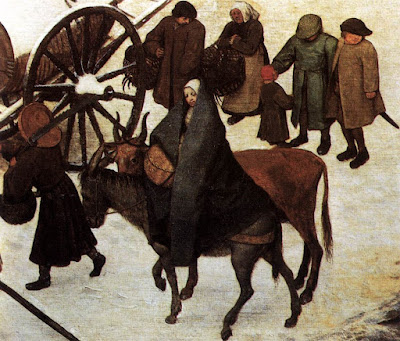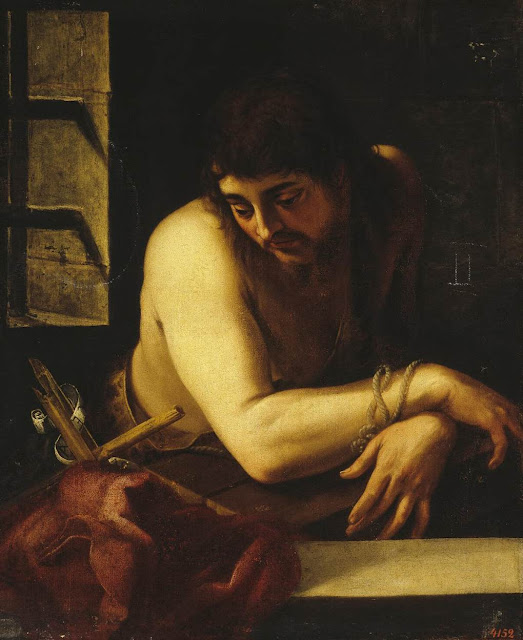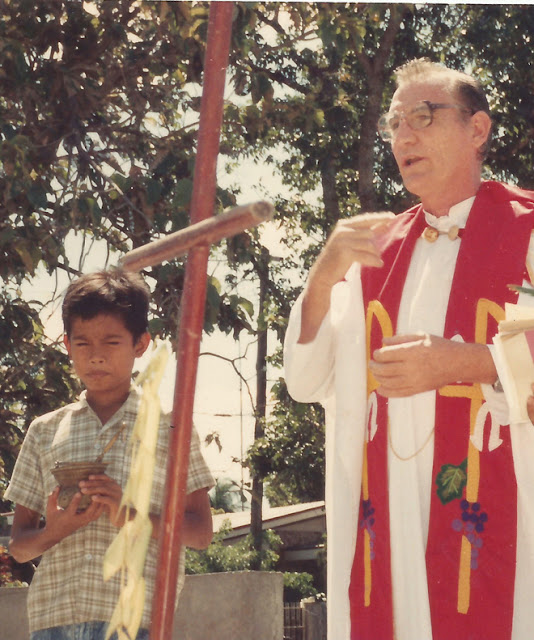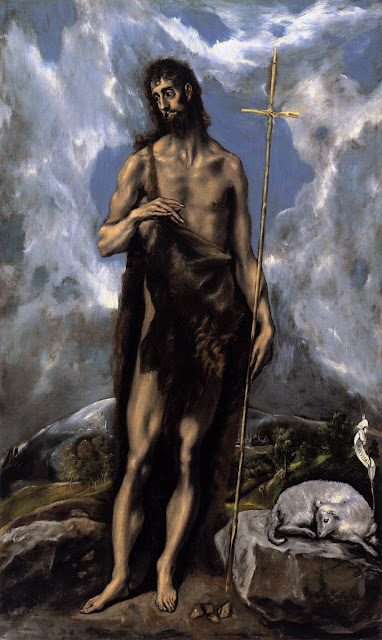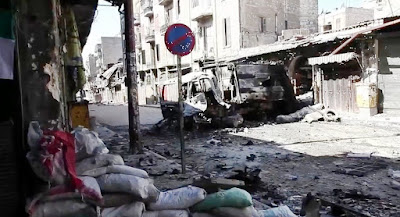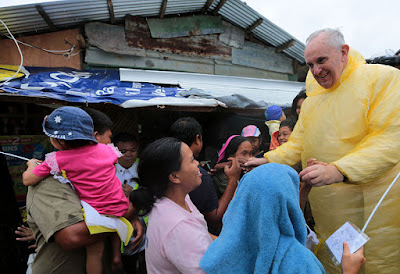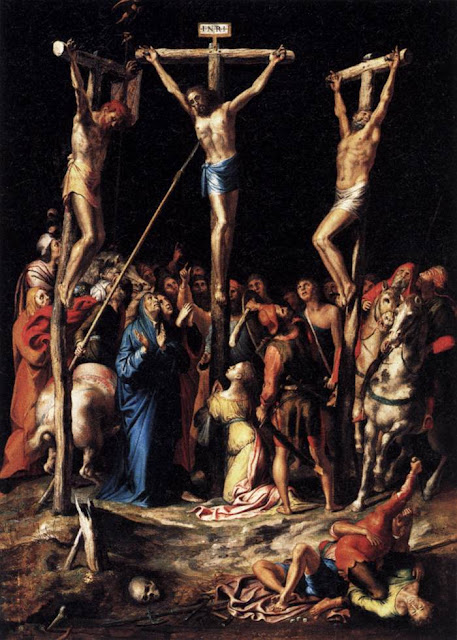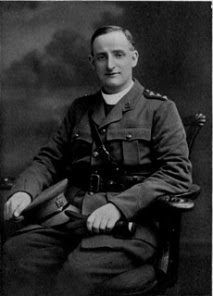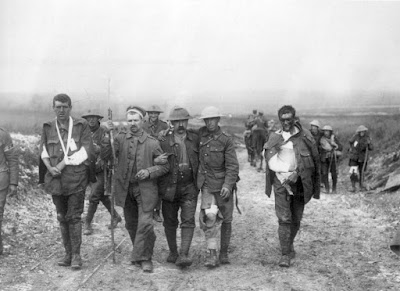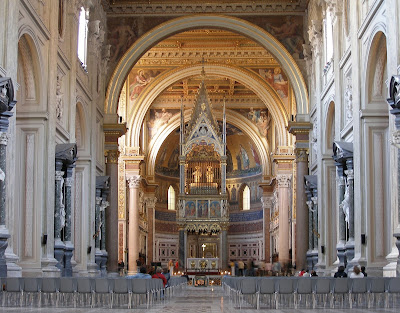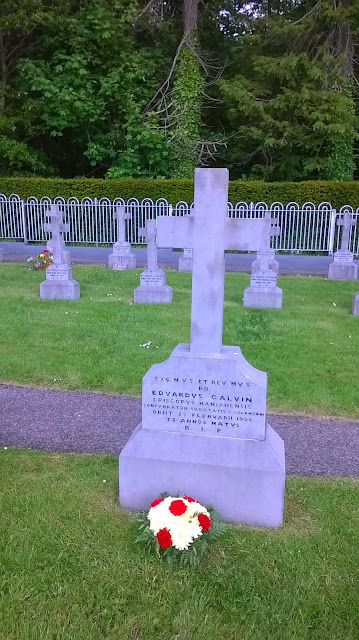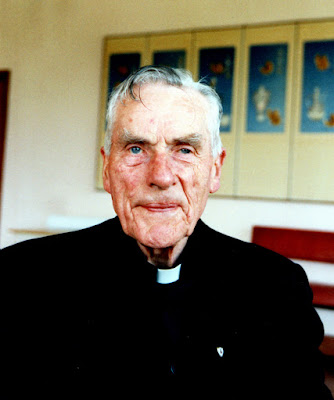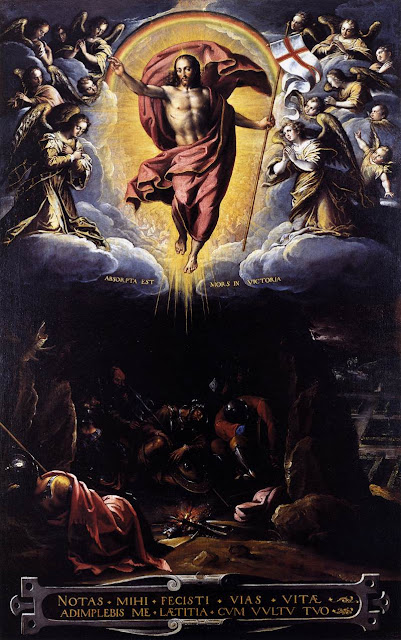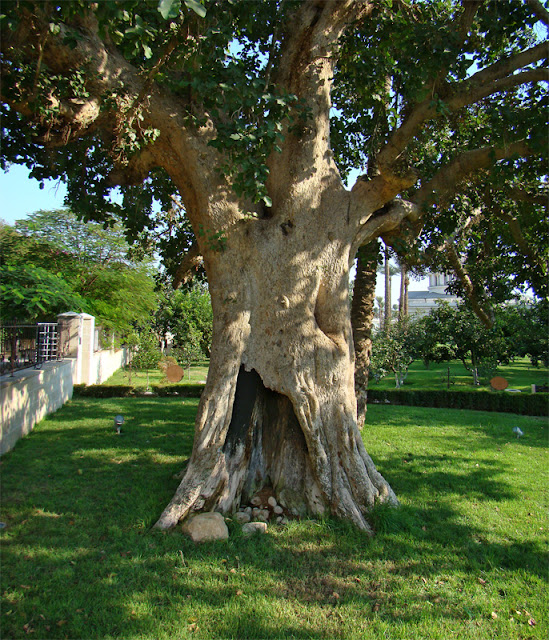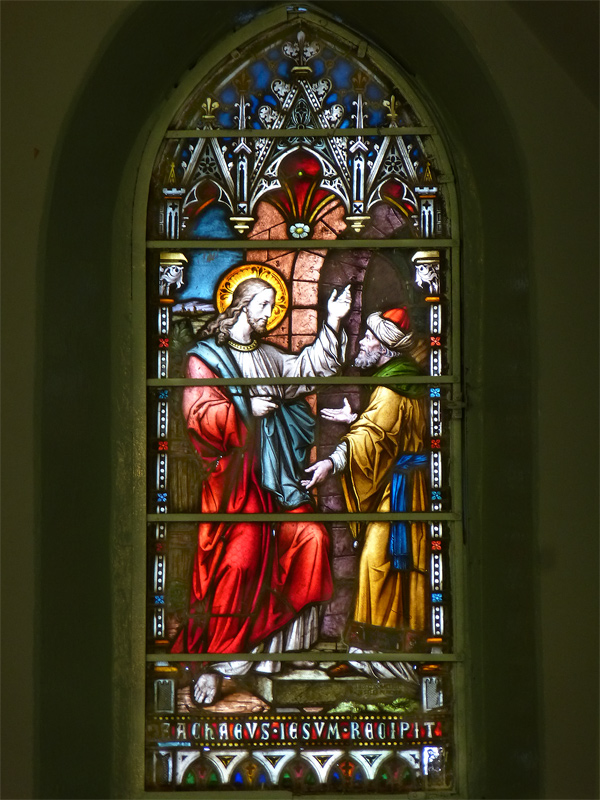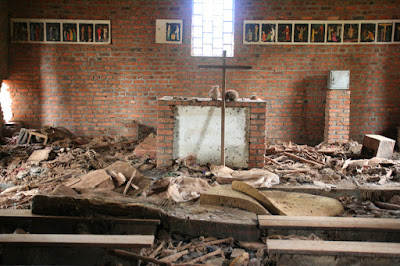
The Dream of St Joseph, Georges de la Tour [Web Gallery of Art]
Readings (New American Bible: Philippines, USA)
Readings (Jerusalem Bible: Australia, England & Wales, India [optional], Ireland, New Zealand, Pakistan, Scotland, South Africa)
Gospel Matthew 3:1-12 (New Revised Standard Version, Anglicised Catholic Edition)
Now the birth of Jesus the Messiah took place in this way. When his mother Mary had been engaged to Joseph, but before they lived together, she was found to be with child from the Holy Spirit. Her husband Joseph, being a righteous man and unwilling to expose her to public disgrace, planned to dismiss her quietly. But just when he had resolved to do this, an angel of the Lord appeared to him in a dream and said, ‘Joseph, son of David, do not be afraid to take Mary as your wife, for the child conceived in her is from the Holy Spirit. She will bear a son, and you are to name him Jesus, for he will save his people from their sins.’ All this took place to fulfil what had been spoken by the Lord through the prophet:
‘Look, the virgin shall conceive and bear a son,
and they shall name him Emmanuel’,
which means, ‘God is with us.’ When Joseph awoke from sleep, he did as the angel of the Lord commanded him; he took her as his wife.
Responsorial Psalm [NAB Lectionary]
In December 2002 I met a man in Manila, Mang Pepe, and his daughter Ligaya whose story reminded me so much of that of Joseph and Jesus in today’s gospel. The story of Mang Pepe and Ligaya is told here by a Columban lay missionary from Korea, Columba Chang, who worked for many years in the Manila area and whose ministry at the time she wrote this story was to families affected by HIV/AIDS. The names used aren’t their real names. ‘Pepe’ is a nickname for a man named Jose or Joseph. ‘Mang’ is a Tagalog term of respect for a man older than oneself. ‘Aling’ is the equivalent term for a woman. The name ‘Ligaya’ means ‘Joy’. The story was first published, as I recall, in a newsletter of Caritas Manila and I used it in the November-December 2003 issue of MISYON, the Columban magazine in the Philippines that I edit. I republished it in the November-December 2015 issue of the magazine, now called MISYONonline.com. I think it is a story worth telling over and over again. Columba is now based in Myanmar as a member of a small team of Columban Lay Missionaries there. I have updated the introduction.
I Met St Joseph in Manila
by Columba Chang
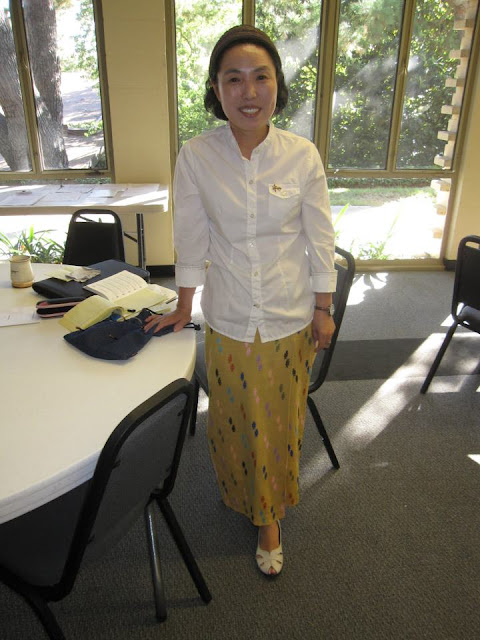
Columba Chang, 2012
According to official Philippine government figures there were more than ten million Filipinos, about ten percent of the population, overseas as of December 2012, more than half of them temporary or irregular in the countries where they are staying. These temporary and irregular residents are mostly Overseas Filipino Workers (OFWs). They greatly help our country’s economy by the money they send home. However sometimes we seem to take them for granted, thinking that they have an easy life abroad. Read Aling Maria’s story and find out the dangers our OFWs face and the abuses they experience. We thank ‘Mang Pepe’ for his help in writing this article in which we’ve changed the names.
I met Mang Pepe and his daughter Ligaya through my work with Caritas Manila. I visit the family regularly. They live in a poor part of the city and Mang Pepe makes a living by doing odd jobs. My work takes me to families affected by HIV/AIDS. I knew Mang Pepe’s story before he shared it with the congregation at the Saturday evening Mass in Baclaran Church on 7 December 2002 at the end of a celebration organized by Caritas Manila for World AIDS Day. (Baclaran Church is the huge Redemptorist church in Parañaque City, Metro Manila, filled to capacity all day every Wednesday when the Perpetual Novena to the Mother of Perpetual Help is celebrated from morning till evening.)
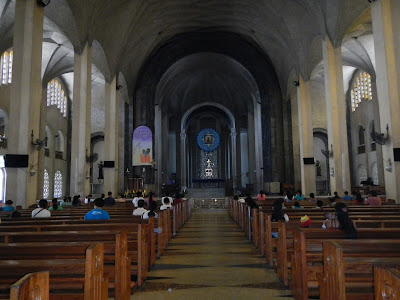
Baclaran Church [Wikipedia]
Greener Pastures
Mang Pepe and his wife Aling Maria were having difficulties putting their five children through school. This sometimes led to arguments. Eventually Aling Maria decided to work in the Middle East. She felt happy when accepted as a nursing aide with a two-year contract in the UAE. She prepared her documents. She and Pepe sold their house and lot for her fare and placement fee. She flew out on 5 February 1989, full of hope for her family’s future financial stability.
Aling Maria soon discovered that her contract as a nursing aid was terminated just a few months after she arrived, without any hope of renewal. But she didn’t want to go back to the Philippines with an empty pocket. She decided to take the ‘TNT’ (‘Tago ng tago’, a Tagalog expression meaning to be an illegal immigrant worker) route. She managed to find a series of jobs as a saleslady, cashier and office worker.

Columba (inset) when working in Metro Manila
Hope turns into a nightmare
As an illegal worker, Aling Maria was often subjected to different abuses like underpayment, long hours of working without a day off and so on. But the worst thing was when one of her employers took advantage of her and made her pregnant. When she came home to the Philippines in October 1993 Mang Pepe and the family were very shocked to learn that Aling Maria carried a child in her womb. She hadn’t mentioned anything about this before. However, despite this they still welcomed her and the child with joy . . . but deep in their hearts there was a shadow of sadness, fear and uncertainty.
After a few days the tabloids reported that three Filipino overseas workers had been sent home because of being infected with HIV, the virus that causes AIDS – and that one of them was Aling Maria. These stories, and the rumors they spawned, continued for a month. Some relatives, neighbors and friends rejected Aling Maria. The children of Mang Pepe and Aling Maria were torn apart. Some wanted to quit school and leave the area. The family suffered greatly because of the stigma.

Columba with a friend in Manila
Confirmed HIV
Aling Maria and Mang Pepe went to the Department of Health (DOH) for a series of blood tests. The tests confirmed what Aling Maria knew already, that she and her ‘little mercy child,’ as Mang Pepe called his wife’s daughter had HIV. The doctor gave them counseling and advice and information about HIV/AIDS.
Ligaya is born
Aling Maria decided not to say in the hospital and continued to work as a pension plan insurance agent. In time she gave birth to a baby girl whom they named Ligaya. Gradually, however, Mang Pepe saw his dear wife turning into a picture of misery as she suffered from constant headaches and flu. Aling Maria was hoping for a miracle that would ease her agony. It was not to be. The HIV developed into full-blown AIDS. Her appetite disappeared until she couldn’t eat anymore. MangPepe and the children saw Aling Maria slowly dying. He prepared the family to accept her death as the will of God. She died on 15 December 1997, aged 46.
Like everyone else in Baclaran Church, I was deeply touched by MangPepe’s story, even though he had told it to me many times. I was touched by the great love of this simple man who accepted as his own a daughter who was the fruit of the brutal violation of his wife. MangPepe is ‘Tatay’ to Ligaya. Her schoolmates sometimes tease her because her features clearly show her Middle Eastern origins. But her Tatay stands by her, as do her brothers and sisters.

Baclaran Church [Wikipedia]
Proud to be her Tatay
Tatay Pepe is proud of Ligaya’s singing ability and smiled as she sang at the celebration in Baclaran. Ligaya is very proud of her Tatay and knows the depth of his love as a father. She has very uncertain health and is often in the hospital. The shadow of AIDS hangs over her.
St Joseph named Jesus, the Son of Mary, and thereby became his legal father. He loved Mary, his wife, and raised Jesus as his own son. MangPepe has gone through the agony of knowing that his wife was violated overseas, after dishonest employers had taken advantage of her in other ways. When she brought home a child who was not his, he made her his own. This latter-day St Joseph in Manila has given much joy to his daughter Ligaya as she has given much joy to him and others, like myself, who have come to know and love her.
I was in Baclaran Church that day at the invitation of Columba and, during an activity before Mass, came to know ‘Ligaya’ as a friend. Shortly before she died towards the end of 2004 I had the privilege of talking to her on Columba’s cellphone. She was a delightful child. The light of heaven upon her.

St Joseph and the Christ Child, El Greco [Web Gallery of Art]
The late American Scripture scholar Fr Raymond E. Brown SS points out that St Joseph, by taking Mary as his wife and by naming her Son, as the angel in today’s gospel told him to do, in Jewish law, became the legal father of Jesus, something more than being his foster-father, as he is often described. And because St Joseph was of the line of David, so was Jesus, as the Messiah was foretold to be.
The Church honours St Joseph above all as the Husband (or Spouse) of Mary. Pope Francis has underlined this by adding the words ‘and blessed Joseph her spouse’ to Eucharistic Prayers I, II and III, as they were added to the Roman Canon (now also known as ‘Eucharistic Prayer I’) by Blessed Pope John XXIII.
Mang Pepe totally welcomed Aling Maria back from the Middle East as his wife whom he loved, despite his initial shock at what had happened to her. And he totally welcomed her daughter Ligaya as his own, as St Joseph welcomed the Son of Mary as his own.
Today’s Gospel reminds us of the fact that the basic vocation, ie, call from God, of every married couple is to be spouses, not to be parents. Being parents is a consequence of their being spouses. I’m well aware that there are single parents, many of whom have never been married, who are heroically raising their children, often in very difficult circumstances. But it is God’s will that children be born within marriage.
St Joseph was a loving husband to Mary and a loving father to her Son Jesus, God who became Man. Mang Pepe continued to be a loving husband to Aling Maria until she died and was a proud and loving father to her daughter Ligaya, as I could see so clearly.
Today’s Gospel shows us something of the wonder of being called to be a husband and father and of the immense responsibility that goes with that. St Joseph as husband and father enabled Mary and Jesus to carry out the mission that God the Father had given them.
What applies to husbands/fathers applies equally to wives/mothers.
And the Gospel reminds us very clearly that in God’s plan the foundation of the family is marriage, that is, of husband and wife, of man and woman. It can never be anything else.
Motet for five voices (SATTB) by William Byrd (c. 1540-1623)
Antiphona ad communionem
Communion Antiphon Isaiah 7:14
Ecce Virgo concipiet, et pariet filium;
Behold, a Virgin shall conceive and bear a son;
et vocabitur nomen eius Emmanuel.
and his name will be called Emmanuel.

